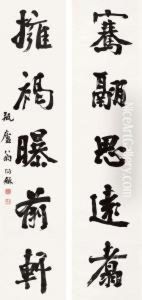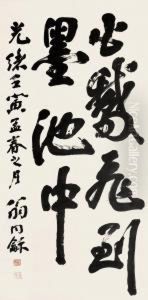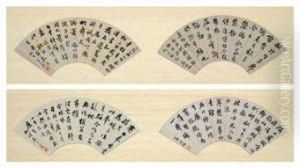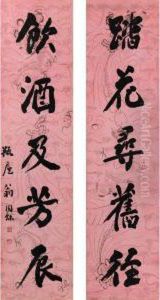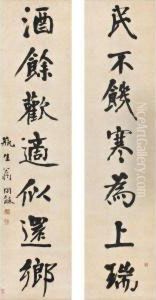Weng Tonghe Paintings
Weng Tonghe was a prominent Chinese scholar, educator, and official during the Qing dynasty, born in 1830 in Suzhou, Jiangsu Province. He passed the highest imperial examination at the young age of 20, distinguishing himself early on in his career. Weng's intellectual abilities and mastery over classical Chinese literature and Confucian texts earned him a prestigious position within the Qing court, where he served under two emperors, Xianfeng and Tongzhi, and was a tutor to two future emperors, the Tongzhi and Guangxu Emperors. His influence extended beyond the classroom, as he became deeply involved in the political and educational reforms of the late Qing Dynasty.
Throughout his life, Weng Tonghe advocated for the necessity of reform within the Qing government and educational system, promoting a blend of traditional Chinese values with selective Western innovations. He was a key figure during the Self-Strengthening Movement, a period of institutional reforms aimed at strengthening China against foreign aggression and influence. Despite his commitment to reform, Weng was often caught in the political strife that characterized the Qing Dynasty's waning years, especially during the Hundred Days' Reform in 1898, where he faced opposition from conservative factions within the court.
Weng Tonghe's contributions to Chinese literature and culture were also significant. An accomplished poet, he was known for his classical poetry, which reflected the tumultuous times he lived in and his contemplative nature. His works are considered part of the Tongcheng School, a literary movement that sought to return to the classical prose style of the Tang and Song dynasties. Beyond his literary achievements, Weng played a crucial role in the preservation of Chinese cultural heritage, including the compilation and editing of several important works of historical and literary significance.
Weng Tonghe's legacy is marked by his efforts to bridge the gap between China's rich traditional past and the encroaching modern world. Despite facing criticism from both reformists and conservatives during his lifetime, his intellectual contributions and efforts in education reform have been recognized for their lasting impact on Chinese society. Weng passed away in 1904, leaving behind a legacy as a scholar and statesman who navigated the complexities of a rapidly changing China with a deep commitment to its cultural and intellectual heritage.

